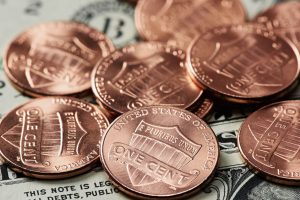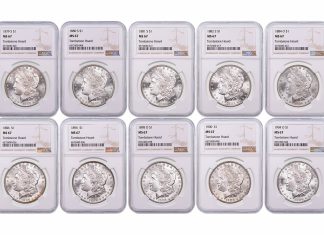
U.S. coining presses slowed for a fourth straight month yet still struck over 1.1 billion coins for a seventh month in a row and for the seventeenth time in the last eighteen months, according to manufacturing figures from the United States Mint.
Not many more than 1.1 billion coins were minted for circulation in July — just another 620,000. Including cents, nickels, dimes, and quarters, the overall tally represents declines of 3.6% from June and 26.9% from July of last year.
Here’s how the month compares against others in the past year:
July 2021 to July 2022 Circulating Coin Production
| Month | Mintages | Rank |
|---|---|---|
| July 2022 | 1,100.62 M | 12 |
| June 2022 | 1,141.60 M | 10 |
| May 2022 | 1,255.32 M | 6 |
| April 2022 | 1,278.88 M | 3 |
| March 2022 | 1,452.58 M | 2 |
| February 2022 | 1,260.12 M | 4 |
| January 2022 | 1,249.84 M | 6 |
| December 2021 | 953.37 M | 13 |
| November 2021 | 1,104.7 M | 11 |
| October 2021 | 1,213.86 M | 7 |
| September 2021 | 1,169.28 M | 9 |
| August 2021 | 1,187.32 M | 8 |
| July 2021 | 1,505.24 M | 1 |
The U.S. Mint’s main mission is to manufacture coins based on the nation’s demand and then transport them to Reserve Banks and their coin terminals for distribution into circulation.
The Federal Reserve orders more 1-cent coins from the U.S. Mint than any other denomination even as data shows that it costs 2.1 cents to make and distribute each one. The Mint struck 433.2 million Lincoln cents in July, representing 39.4% of the circulating-quality coins produced last month. For a second straight month (the previous month was 40.2%), the total was lower than usual. Typically, the percentage is from around 50% to 55%.
Month-Over-Month
In month-over month comparisons for coins used daily by Americans, production totals in July saw:
- 5.5% fewer Lincoln cents,
- 7.9% fewer Jefferson nickels,
- 2.2% more Roosevelt dimes, and
- 2.6% fewer quarters.
Native American $1 coins are no longer ordered by the Federal Reserve, but they are still made in circulating quality for coin collectors. The same is true, or was until last year, for Kennedy half-dollars. Traditionally in January, the U.S. Mint produces both denominations to the expected amounts needed for the entire year. That was the case for Native American dollars in 2021 and for this year (so far), but not for Kennedy halves which saw their mintages increase this year in January, May and June and last year in February, March, April, May and August.
Published mintages of 2022 Native American dollars show equal splits of 980,000 from Denver and 980,000 from Philadelphia for a combined 1.96 million coins. In contrast, the 2021 dollar logged splits of 1.26 million for Denver and 1.26 million for Philadelphia for 2.52 million coins.
In May, mintages for the 2022 Kennedy half-dollar increased for the second time this year, posting a combined increase of 3.6 million to more than double the 3.2 million made in January. They climbed again in June by 2.9 million. Unchanged in July, half dollar mintages now stand at 4.9 million from Denver and 4.8 million from Philadelphia for a total of 9.7 million. Last year’s half-dollar ended with a mix of 7.7 million from Denver and 5.4 million from Philadelphia for a combined 13.1 million.
The U.S. Mint started selling rolls, bags and boxes of 2022 Native American dollars on Feb. 9. It released rolls and bags of 2022 Kennedy halves on May 5.
Here’s a summary of all the circulating-quality coins produced last month:
U.S. Mint Circulating Coin Production in July 2022
| Denver | Philadelphia | Total | |
|---|---|---|---|
| Lincoln Cent | 216,800,000 | 216,400,000 | 433,200,000 |
| Jefferson Nickel | 72,480,000 | 72,240,000 | 144,720,000 |
| Roosevelt Dime | 141,000,000 | 140,500,000 | 281,500,000 |
| Quarters | 121,000,000 | 120,200,000 | 241,200,000 |
| Kennedy Half-Dollar | 0 | 0 | 0 |
| Native American $1 Coin | 0 | 0 | 0 |
| Total | 551,280,000 | 549,340,000 | 1,100,620,000 |
Minting facilities in Philadelphia and Denver are tasked with making all U.S. coins for commerce. Last month, the Denver Mint struck 551.28 million coins and the Philadelphia Mint pressed 549.34 million coins for the combined 1,100,620,000 coins.
YTD Totals
Year to date, the Denver Mint made 4,485,720,000 coins and the Philadelphia Mint made 4,253,240,000 coins for a total of 8,738,960,000 coins, which is 1.4% fewer than the 8,864,940,000 coins minted through the same period in 2021.
This next table lists coin production totals by denomination and by U.S. Mint facility:
YTD 2022 Circulating Coin Production by Denomination
| 1 ¢ | 5 ¢ | 10 ¢ | 25 ¢ | 50 ¢ | N.A. $1 | Total: | |
|---|---|---|---|---|---|---|---|
| Denver | 2258.8M | 486.24M | 948M | 786.8M | 4.9M | .98M | 4485.72M |
| Philadelphia | 2152.4M | 456.96M | 881.5M | 756.6M | 4.8M | .98M | 4253.24M |
| Total | 4411.2M | 943.2M | 1829.5M | 1543.4M | 9.7M | 1.96M | 8738.96M |
If the current production pace stretched through to December, the annual mintage for 2022 would near 15 billion coins. The U.S. Mint manufactured nearly 14.5 billion coins for circulation in 2021.
2022 Quarter Mintages
In addition to the 2022 Native American dollar with its one-year-only design, the U.S. Mint through July released the first three issues from their four-year program of American Women quarter dollars. Each features a unique design. They include:
- the 2022 Maya Angelou quarter which began circulating in early January. (The Mint started selling collectible Maya Angelou quarters in rolls and bags on Feb. 7.)
- the 2022 Dr. Sally Ride quarter which started circulating toward the end of March. (The Mint started selling collectible Dr. Ride Sally Angelou quarters in rolls and bags on March 22.)
- the 2022 Wilma Mankiller quarter which began circulating in early June. (The Mint started selling collectible Mankiller quarters in rolls and bags on June 14.)
From the overall production total, there are 494.4 million in quarters that the U.S. Mint has yet to officially assign to a design. These are likely most of the Mankiller quarters.
This last table offers a breakdown of this year’s mintages that have been reported by coin design, including the first two quarters:
2022 Circulating Coin Production by Design
| Denver | Philadelphia | Total | |
|---|---|---|---|
| Lincoln Cent | 2,258,800,000 | 2,152,400,000 | 4,411,200,000 |
| Jefferson Nickel | 486,240,000 | 456,960,000 | 943,200,000 |
| Roosevelt Dime | 948,000,000 | 881,500,000 | 1,829,500,000 |
| Maya Angelou Quarter | 258,200,000 | 237,600,000 | 495,800,000 |
| Dr. Sally Ride Quarter | 278,000,000 | 275,200,000 | 553,200,000 |
| Wilma Mankiller Quarter (expected release in June) | – | – | – |
| Nina Otero-Warren Quarter (expected release in summer) | – | – | – |
| Anna May Wong Quarter (expected release in fall) | – | – | – |
| Kennedy Half-Dollar | 4,900,000 | 4,800,000 | 9,700,000 |
| Native American $1 Coin | 980,000 | 980,000 | 1,960,000 |
| Total | 4,235,120,000 | 4,009,440,000 | 8,244,560,000 |






Gee Tennessee! What do you know?
I wonder if the Mint will ever come to its senses and stop making cents.
Makes sense to me. Canada discontinued the denomination in 2012.
Why do we allow ourselves to look like Canada’s slightly “slower” cousin?
Their currency is no long paper, it’s polymer. Mexico also uses polymer for its currency. Only the U.S. still uses paper. Slower maybe be archaic, maybe retarded is more like it.
But if you’re out of “toilet tissue” what good will polymer currency do?
Sometimes it seems like it takes an act of congress to get anything done around here!
And for that matter, Kia99, it often seems that it takes an Act of Congress to get Congress to act.
It’s all politics and behind politics is money.
That being said, I have long ceased to believe that money is the root of all evil. I think fear is the actual root of all evil and money is simply one of the most popular instruments used to help keep fear at bay.
Major D,
Let’s hope that the fear of losing it does not in and of itself make money evil. As far as where the fear of being penniless fits on the totem pole of fears, I would say only below the biggest fear of all, that of death. Other than that, the absence of money implies no shelter, food, health care or transportation, barring the intervention of welfare, naturally.
One does gain a certain sense of freedom from not being tied to material things, but in my recent experience losing a cherished person has left me feeling more untethered, or lost, than free.